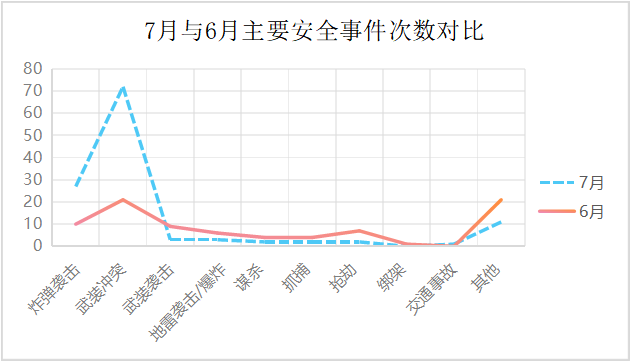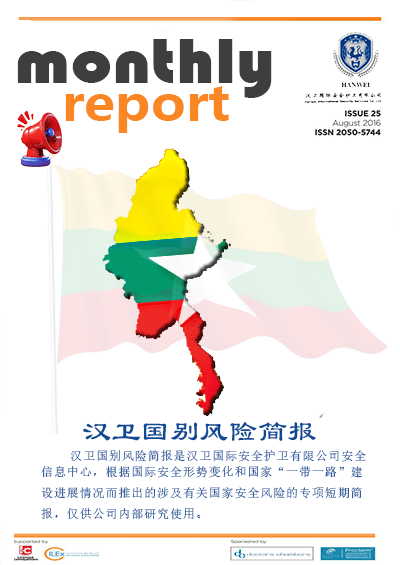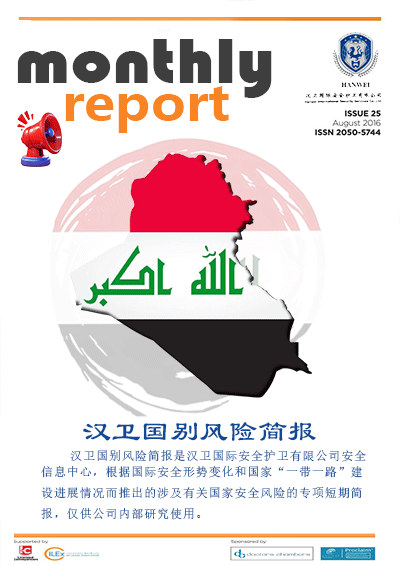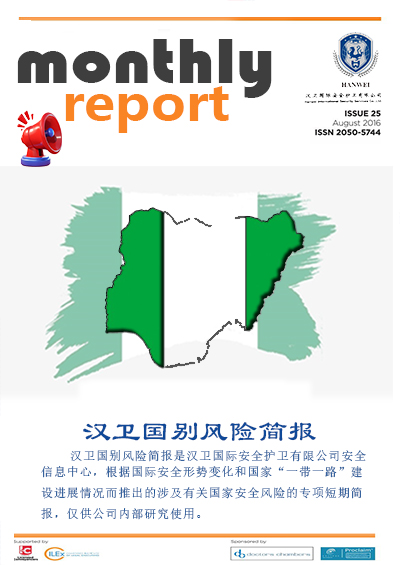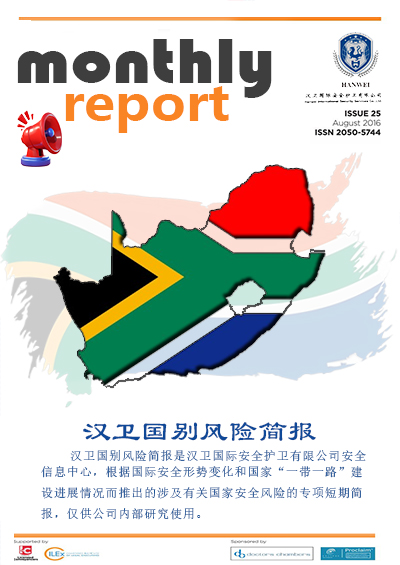Myanmar Risk Monthly Report July
According to the Hanwei International Security Public Opinion Report, a total of 131 representative security incidents occurred in Myanmar in July, 26 more than in June. These incidents resulted in 42 deaths and 78 injuries. Among the categorized security incidents, armed conflicts and bomb attacks were predominant. The majority of security incidents occurred in Shan State, Mandalay, Yangon, and other regions.
Hanwei International analysis indicates that Myanmar's security situation remains tense. Statistics show a slight increase in security incidents compared to the previous month, but the number of deaths and injuries has decreased. The Myanmar crisis has persisted for nearly three and a half years, with no signs of resolution in the political and military tensions. The National Defense and Security Council has decided to extend the nationwide state of emergency for another six months.
Myanmar Crisis Reaches "Fatigue," International Pressure Mounts.
SAC spokesperson Zaw Min Tun recently delivered a televised speech regarding the situation in northern Myanmar, stating that on June 25, 2024, security outposts in Naungcho and Kyaukme areas were attacked by ethnic armed groups. On July 3, the "MNDAA" began attacking areas around Lashio, with the city now facing daily heavy weapon attacks. The famous Chinese Guanyin Temple near Lashio Airport was also bombed. The "MNDAA" initially launched attacks in Chinshwehaw and Kokang regions under the pretext of cracking down on cyber fraud. Subsequently, they expanded their operations beyond Kokang, seeking special administrative status for the region, and held meetings with the "National Unity Government." On July 4, the Special Advisory Council for Myanmar, composed of former UN officials, issued a statement suggesting it is time to move beyond the ASEAN Five-Point Consensus. The statement noted that while the military council accepted the consensus aimed at resolving the post-2021 coup crisis, it failed to implement it. The council encouraged collaboration with the National Unity Government, ethnic armed organizations, and civil society organizations to explore alternative solutions.
The UN has also emphasized the need for measures that match Myanmar's current developments. Since the Northern Alliance launched Operation 1027 in late 2023, the Myanmar military has gradually lost control over territories, particularly in regions bordering China, Thailand, and India. As Laos prepares for the ASEAN Foreign Ministers' Meeting scheduled for July 21-27 in Vientiane, ASEAN is grappling with how to address the Myanmar crisis. As the current ASEAN chair, Laos strictly adheres to the Five-Point Consensus (5PC) as the guiding framework for ASEAN's approach to Myanmar. Laos plans to hold an informal consultation meeting on July 24 with current, former, and future ASEAN chairs to review the implementation of the 5PC. Myanmar's SAC Ministry of Foreign Affairs has formally urged the UN Human Rights Council to maintain neutrality when addressing human rights issues related to Myanmar.
On July 6, during her visit to Cambodia, Japanese Foreign Minister Yoko Kamikawa met with Cambodian Deputy Prime Minister and Foreign Minister Sok Chenda Sophea to discuss regional conflicts and international issues, including Myanmar. On July 26, Thai Foreign Minister Maris Sangiampongsa reiterated Thailand's stance on the Myanmar political crisis during the 57th ASEAN Foreign Ministers' Meeting in Vientiane, expressing willingness to facilitate dialogue among Myanmar's factions for a peaceful resolution while emphasizing non-interference in Myanmar's internal affairs. From July 23 to 27, ASEAN and partner foreign ministers focused on Myanmar's political issues and the South China Sea during meetings in Vientiane. Thai Foreign Minister Maris stated during a meeting with Indonesian Foreign Minister Retno Marsudi that Thailand would support any dialogue yielding positive outcomes for Myanmar's crisis. On July 27, Australian Foreign Minister Penny Wong noted that Myanmar's situation under military rule is deeply concerning and deteriorating, with escalating conflict, severe economic difficulties, increased fatalities, and rising illicit drug production. On July 29, the Quad Foreign Ministers' Meeting in Tokyo issued a joint statement calling for inclusive dialogue to resolve Myanmar's crisis and restore democracy.
Weak Economic Outlook, Efforts to Stabilize Development.
Recent reports from international institutions paint a conservative outlook for Myanmar's manufacturing sector, expecting limited growth potential in the coming year. According to Myanmar's Eleven Media Weekly, public concerns over private banks have led to massive cash withdrawals, causing unnecessary inflation and price hikes. A Central Bank deputy governor attributed financial instability to sensational media reports triggering public panic. Myanmar operates as a market economy, with the Central Bank and banks functioning independently, but recent violations have disrupted economic policies, necessitating government oversight. SAC Secretary-General Aung Lin Dwe assured the public against excessive withdrawals due to rumors, emphasizing efforts to ensure banking system stability and public trust. On July 29, the SAC announced legal action against seven private banks, including Yoma Bank and UAB Bank, for exceeding mortgage loan limits set by the Central Bank, and against lax regulatory officials. The SAC stated it is working to stabilize and develop the domestic economy, with the Central Bank permitting private banks to issue long-term mortgages to improve housing access. The SAC also reported investigations into 102 rice warehouses, 25 rice mills, and seven large rice shops across major cities for selling rice above government-set prices, arresting 11 rice traders and four major retailers. From April to June 2024, the Myanmar Investment Commission (MIC) approved 48 domestic and foreign projects, with transport and communications receiving the most investment. Foreign investments totaled $147 million, while local investments reached 12.1506 trillion kyat.
Daily Life Disrupted, Public Despair Grows.
Border trade delays have caused shortages of Thai and Chinese imports in Yangon. The Bayintnaung wholesale market reported delays due to armed conflict, strict inspections, and雨季 roadblocks, leading to rising prices and scarce supplies. The Ta'ang National Liberation Army (TNLA), after capturing Naungcho, seized membership rosters of the Union Solidarity and Development Party (USDP) and arrested members or their families. The TNLA also confiscated properties of alleged military and USDP supporters. Myanmar's Ministry of Education reported that over 13,700 of 48,753 public schools nationwide have closed due to conflict. In Chin State, only 38 of 1,500 schools remain open, while over 4,200 schools are shut in Sagaing Region, the heart of anti-coup resistance. Since June 25, over 30,000 people have been displaced in northern Shan State amid Operation 1027's second phase. An International Republican Institute survey revealed 64% of respondents believe Myanmar is on the wrong track post-coup, with 38% blaming inflation, 34% citing economic downturn, and 32% attributing it to widespread armed conflict. Eighty percent favored democratic governance, with 57% supporting federalism and regional autonomy as the best path forward.
Northern Myanmar's conflict continues to escalate. On July 6, MDY PDF announced joint operations with local forces, capturing 25 military outposts around Madaya Township, seizing weapons including a 120mm mortar. On July 16, Lashio remained a focal point with nightly artillery fire, prompting mass evacuations amid strict "exit-only" controls. Heavy weapon use has devastated neighborhoods, with homes reduced to rubble. On the same day, residents reported attacks on Naypyidaw's Aela Airbase, though no group claimed responsibility. By July 17, revolutionary forces largely controlled Singgu Township in Mandalay Region, arresting 100 soldiers—the first township captured in the region. As of July 23, conflict spread to Sagaing Region, exacerbating ethnic tensions. On July 25, clashes reached Lashio's urban areas, with Guanyin Hill and schools becoming hotspots, roads impassable. A July 24 fire in Ward 5, fueled by unexploded ordnance and absent firefighters, burned unchecked until July 25. In Chin State, Hakha's state court was torched by ethnic armed groups on July 24. On July 31, the TNLA declared full control of Mongmit Township after capturing its last military base, with fighting ongoing in Kyaukme.
Hanwei International Recommendations:
Minimize travel; avoid conflict zones. If caught in crossfire, seek cover and safety.Memorize emergency contacts: Myanmar Police: 0095-199; Medical Emergency: 0095-192; Chinese Consulate in Mandalay: 0095-9-259172726; Chinese Embassy in Myanmar: 0095-9-43209657; China Global Emergency Hotline: 0086-10-12308 or 0086-10-65612308
Chart 1: July Security Incident Categories
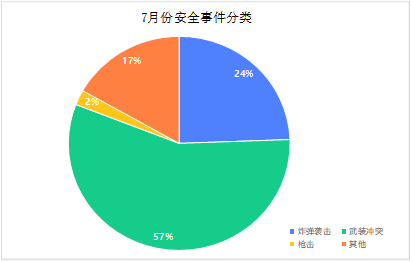
Chart 2: June Death/Injury Statistics
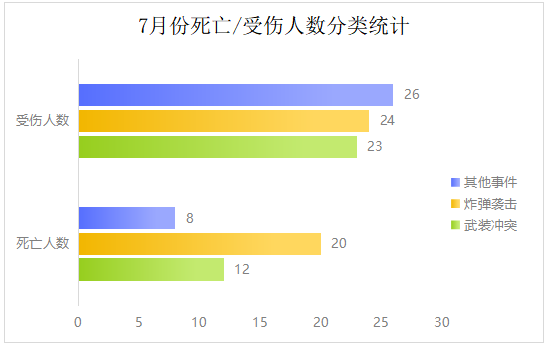
Chart 3: June Provincial Incident Distribution
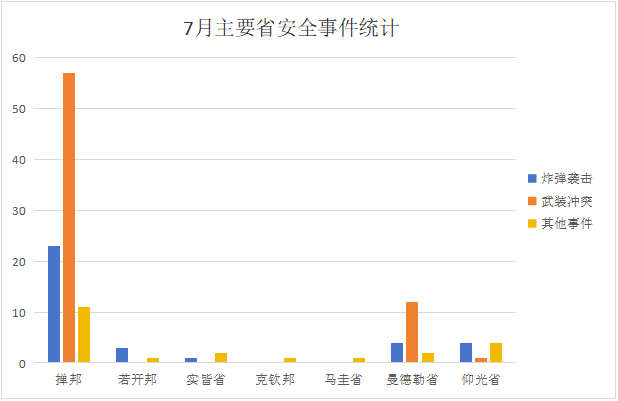
Chart 4: June-July Incident Comparison
